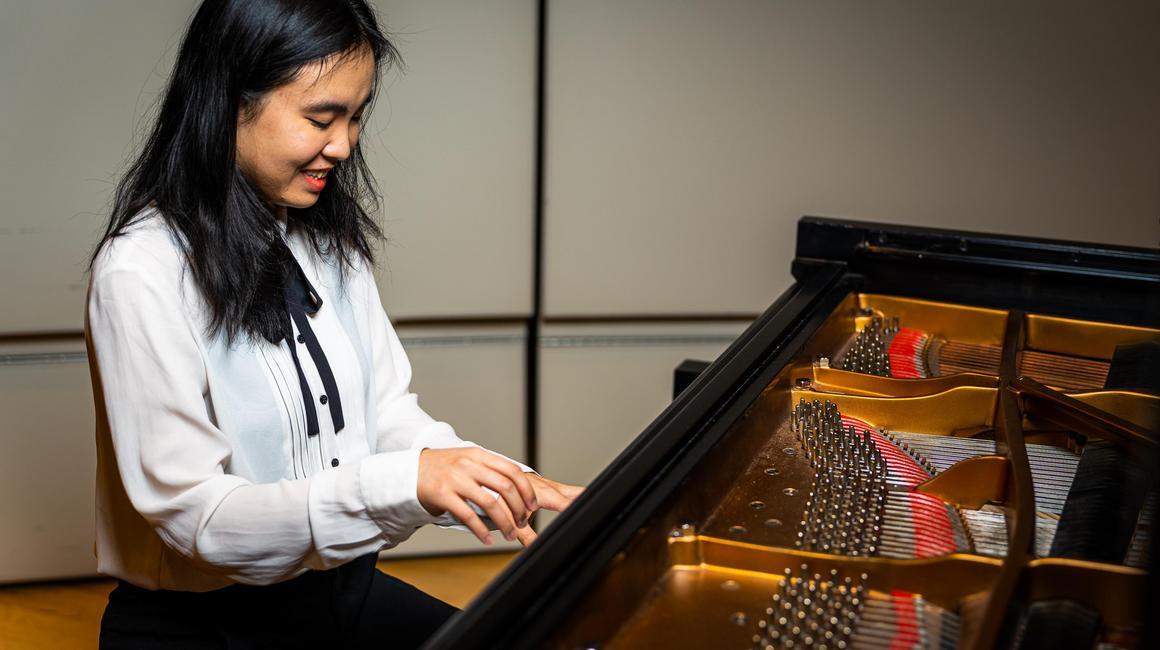Lily Cai has to be in the studio most of the afternoon through the evening, and then she has her work with the Pittsburgh Ballet Theater, which is why the pianist in Duquesne’s Mary Pappert School of Music is making sure she gets in her feast at lunch.
The Chinese performer and her boyfriend, who is also from China, are both doing graduate work in Pittsburgh, but that doesn’t mean the Lunar New Year traditional meal of fish, a whole chicken, and lots of veggies, all with spiritual significance, won’t be enjoyed–it will just be a bit earlier in the day.
Cai is just one of the many Duquesne music students who hails from abroad. The program boasts a considerable percentage of international students—including about half of the graduate students.
But maintaining her cultural traditions is not the only way Cai is remaining true to herself. Though the program is rooted in the European orchestral tradition (think Brahms, Beethoven and Bach), Cai’s desire to perform works written by female composers has been fully supported by her artist-teachers and advisors.
ACTIVE INCLUSION
“Since I started my music master’s, I have been playing at least one female composer in my recitals,” Cai says.
It is important to her to acknowledge and honor work by fellow female musicians, many of whom are often unsung, literally and figuratively, despite their extraordinary contributions to the canon of musical art.
And this is what sets Duquesne apart.
Most recently, Cai performed a piece by Clara Schumann, perhaps better known as the wife of composer Robert Schumann. In the 19th century, she was often noted as the more accomplished Schumann, though much of history has struggled to acknowledge her role beyond that of a supportive wife.
“The first time I heard this piece, I felt how strong Clara can be. Even though she had to give up some of her musical life because of her family, she wants to be a musician,” Cai says of the piano trio in G minor.
“We can hear some ‘fighting’ style from the first and last movements,” Cai says. This intensity is part of what drew Cai to the piece, and what she wants people to feel when she’s playing it.
“I have always required my international students to bring in, study and perform music from their own countries,” says David Allen Wehr, dean of the music school and, as he puts it, Cai’s proud grand-teacher. As an undergraduate, Cai studied with one of Wehr’s first pupils at Duquesne.
During her fall recital last year, Cai’s teachers approved her selection and supported her playing a piece by a contemporary Chinese composer, Dr. Yin Chen—it meant a lot.
Cai is aware of the struggles female musicians have faced, and is thrilled that at Duquesne there is a concerted effort to seek out music from underrepresented groups, such as female or African American composers.
For Cai, that struggle for representation is evident in 200-year-old compositions.
“Until today, the musicians' life is not really fair to females,” Cai says. “Personally, I like most of Clara's music because it is challenging, beautiful…” and expresses the additional struggles faced by female musicians.
SIMPLY HUMAN KINDNESSES
In the Pappert School of Music, efforts at inclusivity do more than check boxes showing Duquesne is aware. Of the students pursuing their unique interests, “It’s one of the ways we get to know them and get to know these other cultures,” Wehr says.
While these efforts might result in better musicianship, they are also simply human kindnesses. It’s nice to feel welcomed, plain and simple.
Each Lunar New Year, which Cai equates to Christmas in China, Cai also passes out hóngbāo, traditional red envelopes stuffed with money. She hands them out to friends before they start their 4-to-6-hour-long practices, or perhaps during one of the many coffee breaks they take where the Latin American students often share imported coffees.
“We have an incredible amount of talent here but we promote it in a way where people aren’t competing with each other,” Wehr says. “They are cheering each other on.”
News Information
Published
May 02, 2022


